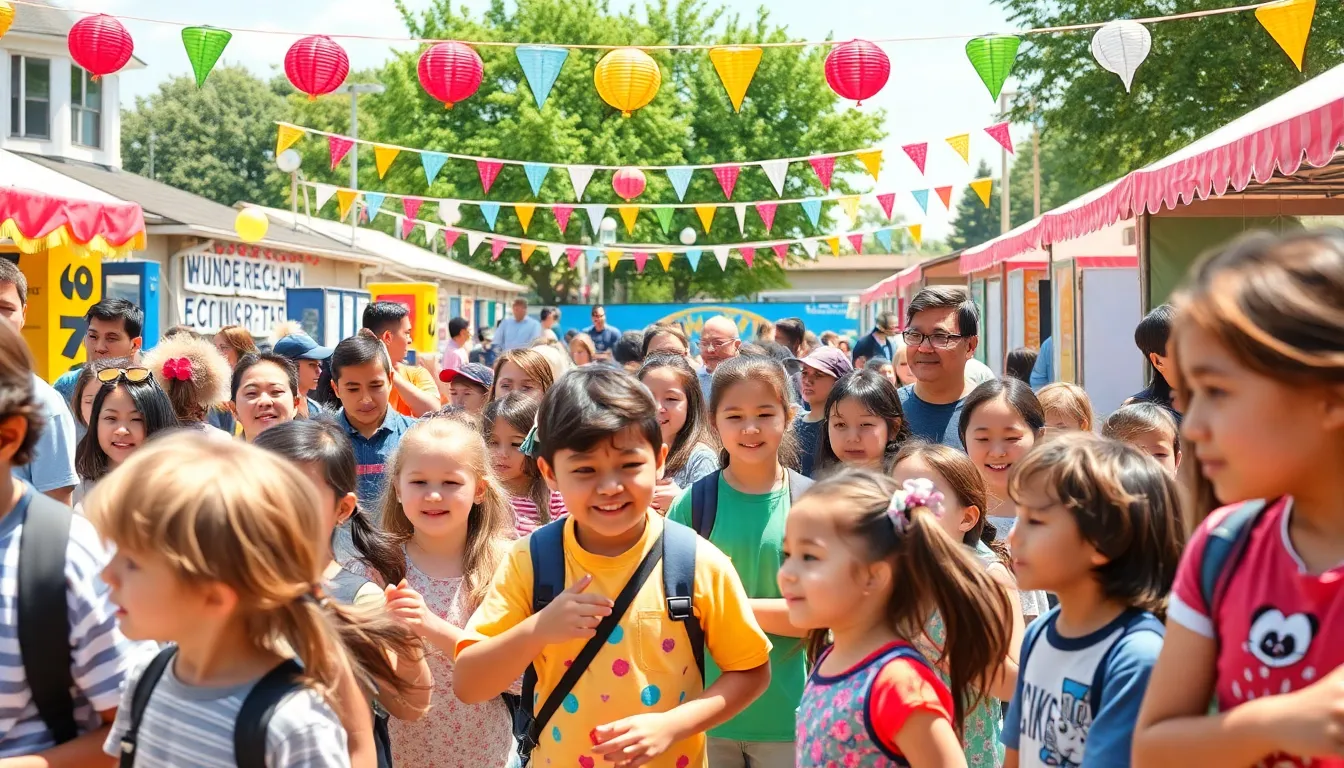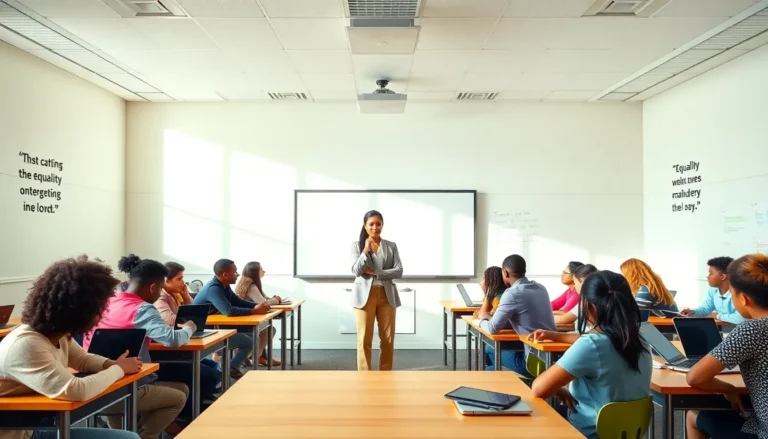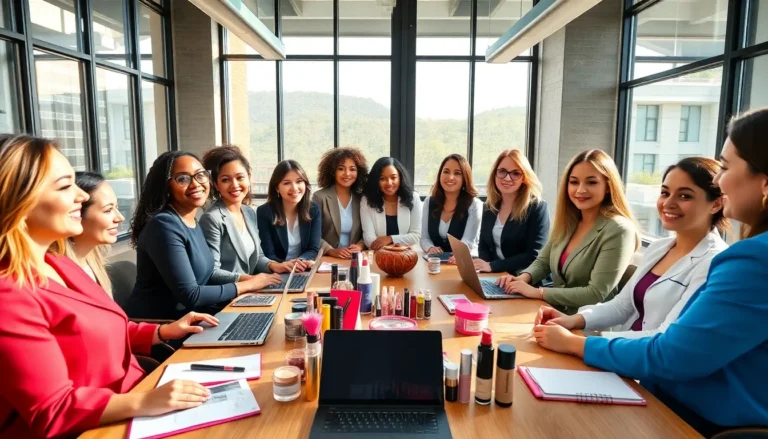School events play a crucial role in shaping the educational experience for students, fostering community spirit, and building lasting memories. From vibrant sports days to engaging science fairs, these occasions bring students, teachers, and families together, creating a sense of unity and belonging.
These events not only showcase student talents but also promote teamwork and leadership skills. They provide an opportunity for students to step outside the classroom and engage in activities that enhance their social and emotional development. Whether it’s a talent show, a fundraising gala, or a cultural celebration, school events enrich the academic journey and create a vibrant school culture that students cherish for years to come.
Table of Contents
ToggleOverview of School Events
School events encompass a variety of activities designed to engage students, families, and faculty. These gatherings serve multiple purposes, including promoting school spirit, encouraging participation, and celebrating achievements. Common school events include:
- Sports Days: Competitive events that allow students to showcase athletic skills, fostering teamwork and school pride.
- Science Fairs: Opportunities for students to present scientific projects, stimulating interest in STEM subjects and critical thinking.
- Cultural Festivals: Celebrations that involve showcasing diverse cultures, enhancing understanding and appreciation among students.
Moreover, school events often include fundraising activities, parent-teacher conferences, and talent shows. Each gathering aims to strengthen community bonds and support student development.
Attendance at school events significantly impacts student engagement. When students participate in these activities, they build social networks, gain confidence, and develop leadership abilities. Overall, school events play a crucial role in enhancing the educational experience and nurturing a cohesive school environment.
Importance of School Events

School events significantly strengthen the educational experience by fostering connections among students, teachers, and families. These gatherings contribute to a vibrant school culture while enhancing overall student development.
Building Community
Building community through school events creates a sense of belonging among students, parents, and educators. Hosting events like cultural festivals and open houses encourages families to participate actively in school life. Community involvement fosters relationships, promotes understanding, and supports collaboration among diverse groups. Additionally, these events often involve local businesses and organizations, strengthening ties between the school and the broader community.
Enhancing Student Engagement
Enhancing student engagement occurs through participation in school events, which encourage students to take an active role in their education. Events such as sports days, science fairs, and talent shows motivate students, allowing them to demonstrate their skills and interests. Engaged students experience increased motivation, improved attendance, and higher academic achievement. Furthermore, these events provide opportunities for students to collaborate with peers, develop teamwork skills, and build self-confidence, ultimately fostering a more dynamic and interactive learning environment.
Types of School Events
Various types of school events enrich the educational landscape, engaging students and fostering community. Three main categories include academic events, cultural events, and sports events.
Academic Events
Academic events focus on intellectual growth and showcase student learning. Examples include science fairs, spelling bees, math competitions, and art contests. These activities stimulate interest in various subjects, encourage critical thinking, and cultivate problem-solving skills. Participating in academic events allows students to demonstrate their knowledge and creativity while receiving recognition for their hard work. Schools often utilize these events to highlight curriculum achievements and promote a love for learning.
Cultural Events
Cultural events celebrate diversity and inclusivity within the school community. Examples include cultural festivals, talent shows, and International Day. These gatherings provide opportunities for students to share their heritage, explore traditions, and appreciate different cultures. Cultural events enhance understanding among students, promote empathy, and strengthen relationships among families. Engaging in these experiences helps students develop pride in their backgrounds and respect for others, creating a supportive atmosphere within the school.
Sports Events
Sports events encourage teamwork, physical fitness, and school spirit. Examples include field days, intra-school tournaments, and track meets. These activities not only promote healthy lifestyles but also enhance social skills as students collaborate and compete. Participation in sports events builds camaraderie and school pride while teaching valuable lessons in discipline and resilience. Involvement in athletics contributes significantly to students’ overall well-being, fostering a balanced and active lifestyle.
Planning and Organizing School Events
Effective planning and organizing ensure successful school events that enhance student engagement and community involvement.
Setting Goals and Objectives
Setting clear goals and objectives establishes a focused direction for the event. Specific goals may include increasing student participation, promoting school spirit, or highlighting student achievements. Objectives should be measurable and time-bound, such as increasing attendance by 30% compared to the previous year or securing five local sponsors to support funding. By determining these goals, organizers prioritize tasks and allocate resources efficiently to achieve desired outcomes.
Managing Resources
Managing resources involves effectively utilizing volunteers, budgets, and materials. Collaborating with school staff, parents, and community members builds a strong volunteer base, allowing for diverse skill sets to contribute. Budgeting estimates costs for venues, materials, and promotional items while seeking potential sponsorships or grants ensures financial resources are utilized wisely. Proper inventory management of materials and supplies guarantees that the event runs smoothly without shortages or excesses. By maintaining organized oversight of resources, event organizers streamline processes and enhance overall event success.
Challenges in School Events
Planning school events often encounters several challenges that impact their success. Budget constraints and participation levels play critical roles in shaping the experience for students and attendees.
Budget Constraints
Budget constraints limit the resources available for school events, affecting everything from venue selection to promotional materials. Many schools operate with tight budgets, necessitating creative solutions for funding. According to a National Center for Education Statistics report, nearly 80% of public schools have funding shortfalls. Schools often rely on donations, sponsorships, or fundraising efforts to meet expenses. Careful financial planning and prioritization of expenses help ensure that essential elements, such as venues, refreshments, and activities, receive adequate funding. Engaging local businesses as sponsors can alleviate financial pressures while fostering community involvement.
Participation and Attendance
Low participation and attendance diminish the impact of school events, reducing student engagement opportunities. Factors like scheduling conflicts, lack of promotion, or insufficient incentives often contribute to this issue. Research indicates that schools with strong promotion strategies notice a 25% increase in event attendance. Utilizing social media, newsletters, and community partnerships can enhance outreach efforts. Offering incentives, such as prizes or recognition, may motivate students to participate actively. Cultivating an inclusive environment where diverse interests are considered encourages broader participation, ultimately enriching the event experience for all attendees.
School events are vital for creating a dynamic and inclusive educational environment. They not only enhance learning but also foster a sense of belonging among students, families, and educators. Through various activities, students develop essential skills and build lasting relationships that extend beyond the classroom.
Organizers play a crucial role in ensuring these events are well-planned and engaging. By addressing challenges such as budget constraints and participation levels, schools can maximize the impact of their events. Ultimately, a commitment to supporting and promoting school events leads to a vibrant community that enriches the educational experience for everyone involved.



